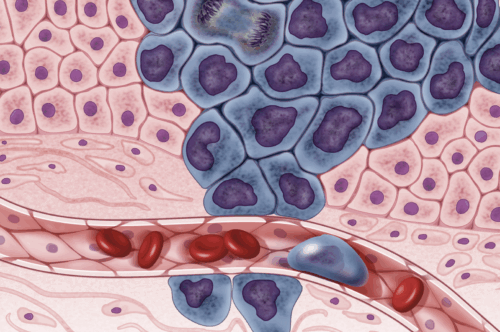Research has identified that sex differences play an important role in non-reproductive cancers—not only in how cancers develop, but also in how patients respond to treatment. Despite mounting evidence, clinical oncology often continues to follow a “one-size-fits-all” model, overlooking sex-based distinctions in genetic targets and drug efficacy. This oversight can lead to suboptimal treatment strategies, overlooked drug interactions, and long-term disparities in cancer outcomes for both men and women. In response to this gap, Xinyi Shen, a PhD candidate in the Johnson Lab led by Associate Professor of Epidemiology Caroline Johnson, collaborated with researchers to develop OncoSexome—a multidimensional knowledge base that catalogs sex-based differences in cancer.
The need for such a resource is pressing. A study by the American Cancer Society found a high incidence of cancer diagnosis among patients under fifty years old in the US; in 2021, women in this age group were eighty-two percent more likely to be diagnosed than men. Furthermore, a 2024 study published in Nature from the National Cancer Institute analyzed 288 clinical trials and found that in 122 of them, female patients had better survival rates and treatment outcomes than their male counterparts.
“Through OncoSexome, we intend to show how environmental factors, genetic information, and drug response differ with sex to give more insight into cancer causes and therapeutics, improving outcomes for patients,” Johnson said.
To build OncoSexome, Shen combed through the scientific literature and multiple databases—including the World Health Organization and The Cancer Genome Atlas Program—to compile a large dataset of sex-based oncology findings. She partnered with Feng Zhu, a professor of pharmaceutical sciences at Zhejiang University, to organize and publish the database.
“There were pockets of information, but it was all over the literature,” Johnson said. “There were also databases with missing aspects to how cancer is multifaceted with various causes.”
To account for the complexity of cancer, OncoSexome contains data describing sex-based differences in cancer across four distinct domains: drug response, biomarkers, risk factors, and microbial landscape.
The drug response domain includes information for 2,051 anti-cancer drugs. OncoSexome outlines sex-based differences in drug efficacy, adverse reactions, pharmacokinetics, and hormonal interactions—highlighting how treatment effects can vary between men and women.
The biomarkers domain contains data on 12,551 sex-based biomarkers related to immune responses, genetic variation, and hormonal regulation in the context of various cancers. These biomarkers play a critical role in diagnosis and monitoring, as well as informing personalized treatment plans.
The risk factor domain focuses on environmental carcinogens and lifestyle-related risks, cataloging how these variables interact differently with male and female biology to influence cancer development.
Finally, the microbial landscape domain includes data on 1,386 microbes, detailing their sex-specific abundances and statistical correlations with cancer incidence. Not only can this data aid in the prediction of cancer development, but it can also contribute to cancer prevention when analysed with other attributes such as biomarkers and risk factors.
In addition to its breadth, OncoSexome is designed to be interactive and user-friendly. The homepage introduces the platform’s four core domains and allows for intuitive navigation. A prominent search function enables users to browse by domain or specific cancer type, allowing researchers, clinicians, and public health professionals to quickly find sex-specific data relevant to treatment planning and study design. A dedicated “Manual” section provides guidance on how to navigate the platform efficiently.
Since its launch, OncoSexome has attracted global attention. The platform has been accessed over four hundred thousand times, with an average of more than twenty thousand visits per week. Users span North America, South America, Asia, Africa, and Oceania, underscoring the growing demand for sex-specific cancer research tools.
Ultimately, OncoSexome offers a powerful new avenue for clinicians and researchers to integrate sex-based biological differences into the understanding, prevention, and treatment of cancer.

